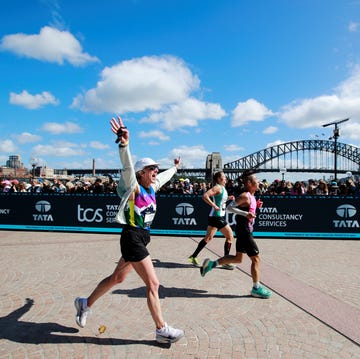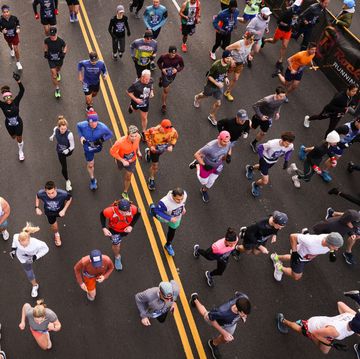Khalid Elkhereiji knew the pace and weight of my footsteps before I ever raced a marathon with him. Twelve years ago I was Elkhereiji’s English teacher in Boulder, Colorado, and he became my first visually impaired friend. He could identify when I was approaching, he’d tell me, as I walked down the hall toward our classroom.
About a year ago, remembering me as “the runner,” Elkhereiji emailed to tell me he had begun running races, and to ask if I would be willing to guide him. This request came from a man who grew up in a country that still doesn’t allow women to drive—though he now lives in England, Elkhereiji is Saudi Arabian.
We made plans to run the 2016 Chicago Marathon. In October Elkhereiji, 34, flew to the U.S., and together we made that dream a reality with the help of another guide, Kyle Larson. After spotting a Facebook post looking for volunteers, Larson said, “I thought about it for an hour and then emailed my friend at the Chicago Achilles chapter.” Of the decision to guide a man he’d never met, Larson said, “We are runners. What more did I need to know to trust we’d get along?”
In many ways, Elkhereiji is a pioneer. There are comparatively few people involved in the sport of running from Saudi Arabia—only 10 other Saudis have run the Chicago Marathon since 2000, according to their official results—and Elkhereiji was doing it blind.
Elkhereiji is precise. This Ph.D. student in linguistics determines a race plan as carefully as he selects his words. He follows the latest technology in running trends. He makes his own gel packs out of dates, sea salt, water, honey, and chia seeds. And he approached our roles with the same thoroughness, researching the best guiding strategies for us.
This was the plan he developed: For the first 13 miles I guided Elkhereiji via a tether while Larson managed the crowd, shouting out splits, and grabbing fuel at the aid stations. Then, at mile 13, we switched roles. It was astounding to watch Elkhereiji run with such ease in his own vulnerability, all while graciously excusing our mistakes along the way.
As we passed through the various neighborhoods of Chicago, Larson, who has lived in the city for four years, gave a verbal illustration of their unique characteristics.
Elkhereiji’s wife raced all over Chicago navigating their 3-year-old-son and a stroller through their first American city. His son’s sweatshirt read, “Daddy is the fastest.” She was hard for us to spot, but Elkhereiji had no problem. “We just passed my wife,” Elkhereiji announced, having recognized her voice cheering among the crowd at mile marker 20.
The last six miles were a struggle, but the crowd support and Larson’s reminders of “Tell your legs to shut-up,” helped pull us through. In what was only his second marathon, Elkhereiji ran a 36-minute PR in 3:35:51 and finished in the top 15 percent overall.
After the race, Elkhereiji’s wife and son met us at the finish. They were beaming with gratitude and pride. “Thank you for this amazing opportunity you’ve given Khalid,” she later texted me.
“Thank you for trusting me before you even met me,” I replied.
Running is not a sport that wears status on its sleeve—it’s humble. Before the three of us saw each other as male or female, American or Saudi, Christian or Muslim, we saw each other as runners. And as runners, we may compete against each other—but we also help each other regardless of our differences. This requires trust and looking for guidance in relationships that some people are fearful of, or deem inconceivable.
This holiday season I give thanks for the opportunity to have guided Elkhereiji and for the trust both he and his wife had in Kyle and me.
* * *
Amanda McCracken is a freelance writer, massage therapist, triathlon coach, and competitive athlete. You can find more about her at her website.
Other Voices welcomes submissions from readers. To submit your post for consideration, email us at [email protected]. Please write “Other Voices” in the subject line. Runner’s World reserves the right to edit posts for length and clarity. We will contact you if your post is being considered for publication. We do not offer compensation for Other Voices posts.













